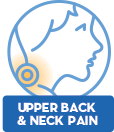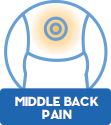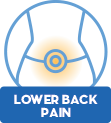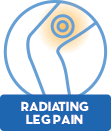




Understanding the Spine
Thirty-three individual bones or vertebrae make up your spine. They’re stacked on top of one another and interlock to create your spinal column.
Your spinal cord runs through the hollow space in the center of each vertebra. The spinal cord goes from the bottom portion of your brain to the vertebrae at the base of your spine. Its job is to transmit messages between your brain and the rest of your body.
For example, messages from your brain make your body move. Messages from your body to your brain convey information about what we touch and feel. Spinal nerves branch off your spinal cord and assist in this communication.
Besides vertebrae, other parts of your spine include:
Regions of the Spine
Your spine is divided into three regions. Unique characteristics of the vertebrae in each region allow them to do their job.
- Cervical spine – the neck region
- Thoracic spine – the middle back region
- Lumbar spine and sacral region – the lower back region
Similar problems may affect each region of your spine. But your symptoms may be slightly different.
Spine Pain and Other Problems
Everyone experiences pain differently. Your pain might be dull and achy or sharp and shooting. Even symptoms you may not consider pain may relate to a back condition. Recognizing these symptoms and being able to describe them to your doctor may help you get an accurate diagnosis.
Sometimes, pain is acute. This discomfort begins suddenly, often because of an injury. Chronic pain lasts or returns for more than three to six months. Chronic pain can also last longer than a doctor would expect as you heal from an injury.
Symptoms beyond back pain that may signal a back injury or condition include:
When to Call the Doctor
In many cases, spine pain gets better on its own or with self-care at home. But if you have discomfort for more than two weeks, or your pain interferes with daily life, it’s important to seek help. Immediately seeking help is crucial if you also have other serious symptoms, such as loss of bowel or bladder control.
There are spine pain solutions, and we can help you find them.
We’re Right Here to Help
With unmatched experience in diagnosing and treating spine pain, your condition will be carefully evaluated by the team of experts at the Spine Center as we work with you to develop a customized treatment plan. Highly skilled and caring providers, plus state-of-the-art technology and treatments, means you’re at the right place for exceptional patient care.
Affiliations with OrthoCincy Orthopaedics & Sports Medicine and Mayfield Brain & Spine ensure you receive the highest possible level of spine care.

